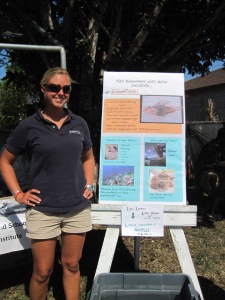When Island School alum Skylar Miller (S’03) returned to Eleuthera in the summer of  2010, she was looking for an opportunity that bridged her passion for teaching concepts of marine biology with field-based research. “When I heard the Cape Eleuthera Institute’s mission of ‘Research, Education, and Outreach’ I thought: That’s perfect. That’s exactly what I want to do,” Miller reflected. She has since become a pioneer for that mission. Her collaborative work has resulted in the creation of CEI’s Lionfish Research and Education Program, in partnership with the Reef Environmental Education Foundation (REEF) and Simon Fraser University (SFU).
2010, she was looking for an opportunity that bridged her passion for teaching concepts of marine biology with field-based research. “When I heard the Cape Eleuthera Institute’s mission of ‘Research, Education, and Outreach’ I thought: That’s perfect. That’s exactly what I want to do,” Miller reflected. She has since become a pioneer for that mission. Her collaborative work has resulted in the creation of CEI’s Lionfish Research and Education Program, in partnership with the Reef Environmental Education Foundation (REEF) and Simon Fraser University (SFU).
The scope of her work is expanding into the future, with many exciting opportunities to forge new partnerships and extend lionfish programming throughout the Caribbean. “Lionfish invasion is a regional issue,” she described. “There are lots of countries similar to The Bahamas’ situation, politically, economically, socially. We need to consider how we can learn from one another. Looking at communication and how we can share ideas is going to be important as we move forward, as we figure out a solution to the lionfish problem.”
This fall, Miller will begin graduate work at the University of the West Indies, Barbados. She is proud to have also been awarded a Teaching Assistantship to support her through the program. She will spend this upcoming fall in Barbados, learning from professors and laying out her proposal for graduate work. Next spring, Miller will return to CEI to perform the field-work portion of her studies, collecting data on post-settlement dynamics. She will be investigating how time and habitat affect where post-larval lionfish settle. She is also eager to mentor and collaborate with UWI in conducting base-line studies under a government funded grant program to establish a local research initiative. Her next two years will be divided between Eleuthera and Barbados, as she pioneers regional lionfish research.
She is also eager for another upcoming educational opportunity. This summer, lionfish will take her southward through the Caribbean to attend the Sao Paulo School of Advanced Sciences-evolution Workshop (SPSAS-evo). She was recently invited to attend this prestigious and competitive education consortium that brings together experts in their fields with the goal of “exchanging and synthesizing knowledge” (http://www.ib.usp.br/zoologia/evolution/index.html). From August 19-31, 2012 on the island of Ilhabela, 200 km off of mainland Brazil, Miller will collaborate with 80 other top scientists, professors, and graduate students from around the world, sharing different perspectives on evolutionary biology. She will be using the perspective of Caribbean lionfish invasion to inform the discussion. “This is a pretty unique situation where we can look into evolution happening before our eyes. It’s predicted that lionfish will spread to Brazil within the next few years and this is an opportunity to connect with scientists there about how to cultivate interest and awareness,” said Miller.
She spoke with humble satisfaction as she described a recent moment of realization: “I was stretching in front of the fishbowl after morning exercise.” Miller, who still chooses to participate in Island School’s morning exercise program alongside students each semester, remembered also that “It was the same morning I got the acceptance from SPSAS-evo. It kind of hit me how lucky I am and how fortunate I felt to be here doing this work. It has all come around full-circle. Wow,” she added. “I was here almost 10 years ago as a student, and how I’ve gotten to come back and all of these things are falling into place for me.”
Look for more updates on Skylar Miller as she works to establish CEI as a hub for Caribbean lionfish research and education, and as she continues to make a name for her self as a leading scientist in the field. Good luck Skye!
